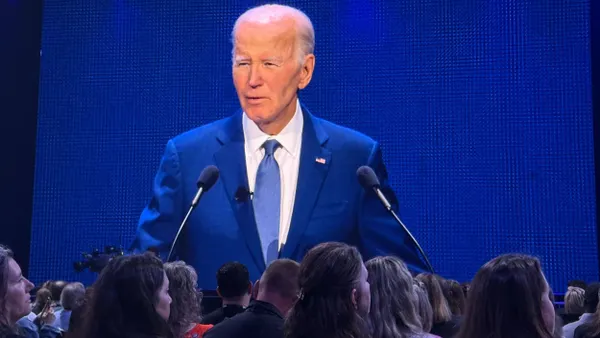Dive Brief:
- On the heels of introducing one-day Prime delivery, Amazon announced it will expand its Delivery Service Partner program, which will help Amazon employees start their own small package delivery businesses. According to a press release, the company will provide $10,000 in start-up funds plus three months’ salary to employees who participate.
- The program first launched in June 2018, but it will now enable current employees to sign on and quit their Amazon posts. Amazon said it will provide its partners with discounts on Amazon-branded uniforms, customized vans and insurance, as well as access to training and delivery technologies and “consistent delivery volume from Amazon.”
- “We’ve heard from associates that they want to participate in the program but struggled with the transition,” said Dave Clark, senior vice president of worldwide operations, in the press release. “Now we have a path for those associates with an appetite for opportunities to own their own businesses.”
Dive Insight:
Increasing its delivery capacity is an important component of Amazon’s push toward one-day Prime, according to HR Dive’s sister publication Supply Chain Dive.
But the company will have to take care to avoid the classification issues that others are facing, as these "employees-turned-business-owners," as Amazon has dubbed them, will have to meet applicable independent contractor tests, including those adopted by the U.S. Department of Labor (DOL), applicable circuit courts and state and local governments.
And when it comes to the Fair Labor Standards Act (FLSA), employers are still awaiting guidance from DOL after the agency withdrew Obama-era classification guidance following the administration change. In the meantime, the agency points to factors the U.S. Supreme Court has considered:
- The extent to which the services rendered are an integral part of the principal's business;
- The permanency of the relationship;
- The amount of the alleged contractor's investment in facilities and equipment;
- The nature and degree of control by the principal;
- The alleged contractor's opportunities for profit and loss;
- The amount of initiative, judgment or foresight in open market competition with others required for the success of the claimed independent contractor; and
- The degree of independent business organization and operation.
Though the subject of control often influences the outcomes of misclassification lawsuits, experts have said that it isn’t the sole determining factor. "[W]hile control isn’t everything – it is a key consideration. The more a company controls (work process, schedules, training, etc.), the more that company is acting like an employer," Katherine Fechte, an attorney in the Employment & Labor practice group at Greensfelder, Hemker & Gale, P.C., told HR Dive in an email. "Most importantly, companies should remember that having workers sign an [independent contractor] agreement and labeling them contractors does not necessarily mean anything to the analysis. Rather, companies should consider all aspects of the contractors’ work and should consult with an attorney to make sure they are not violating the FLSA."
It remains to be seen, of course, whether Amazon's program will catalyze future classification disputes. Under the Trump administration, both DOL and the National Labor Relations Board have concluded that some gig workers are indeed independent contractors. But workers in tech — from Google’s “shadow workforce” of contractors to Lyft and Uber drivers — also have emboldened each other to speak out about perceived mistreatment. Employers might keep in mind this recent uptick in worker activism and the control they might exert over partners when designing similar programs to Amazon’s.













